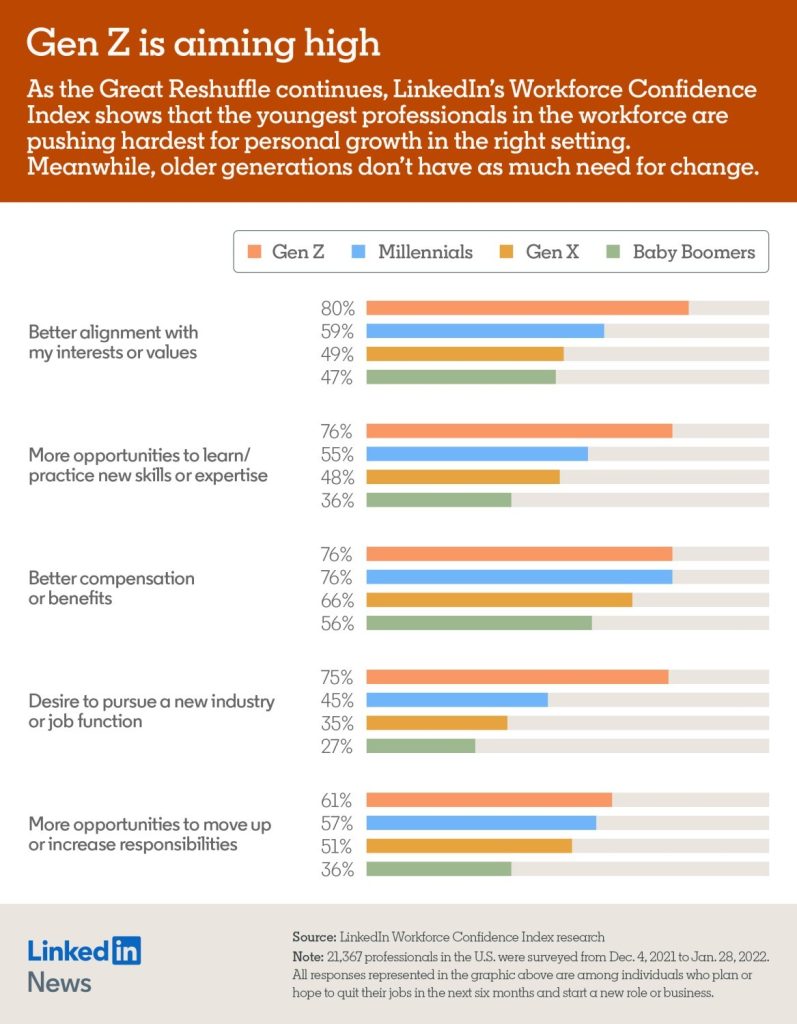Generation Z is the first generation to have grown up without knowing what life was like pre-internet. They’re online, and they’ve never used a paper map, a CD player, or even seen a floppy disk. They have more access to information (and misinformation) than any previous generation, and they take things like one-click shopping for granted.
It’s important to align those differences with what the Z Generation wants from work. Their fundamental differences from other generations reflect in what they want from the workplace and employers. And by 2030, 30% of the global workforce will be Gen Z. So what exactly do they want?
Clarifying Generation Z
Gen Z is largely considered to be people born between 1997 and 2012. Many are already in the workplaces of today, and they’re not wasting any time when it comes to disrupting existing business models. They don’t want to work in the same way that older generations do, and they’re more willing to make career or employer changes to reflect what they want from their lives.
So let’s see what they’re changing and how the workplace will need to evolve to engage and retain the Gen Z workforce.
The Hybrid Workforce
You might assume that Gen Z wants to work entirely remotely. That is the impression in business blogs across the internet. However, the reality is very different. While they might lean towards more of a work-from-home role, they don’t only want to work from home.
In a research study by Cloudbooking and YouGov, the Gen Z ideal work environment is not what you’d expect. It’s a widely held belief that Gen Z is 100% digital native, willing to work from anywhere as long as it’s virtual. But only 11% of the Gen Z workers questioned in The Future of Work: 8 Trends in Workplace Transformation Report said they would prefer full-time work-from-home situations.
Gen Z wants to remain embedded in a traditional work environment, largely because of the developmental and social elements of those workplaces. So organisations that make bold decisions about going fully remote need to make sure they base those decisions on quantifiable data rather than assumptions.
A Better Salary
You might assume that every generation wants a better salary, but for Gen Z, it’s not about being obsessed with money. Instead, it’s because of a very understandable concern about the economy and their unique approach to personal wealth. Remember, many members of Gen Z grew up in the wake of the 2008 global crash and the subsequent global recession.
So not only have they grown up with the first-hand experience of economic uncertainty, but they’ve also witnessed the stress millennials have had to face in terms of expenses like student debts. So they know they need to make as much money as possible to stay safe. They doubt they will ever hit key economic milestones such as buying a home or retiring — they just want to survive.
Diversity, Equity and Inclusion
So a combination of in-house and remote work combined with a good salary are the keys to attracting a Gen Z workforce. But another factor will determine if an organisation can attract that talent. Gen Z wants its employers to care about diversity, equity, and inclusion (DEI). And they’re very savvy about which employers are only paying lip service to it.
A survey by Tallo found that the majority of Gen Z (67%) have witnessed or experienced discrimination in a workplace setting. That number is even higher when asked about witnessing discrimination in schools or colleges. And they won’t tolerate it. In fact, 25% of respondents to the Tallo survey said they would decline a job offer if a recruiter failed to use their preferred pronouns.
The Job Hopping Generation
It’s always been more common for younger generations to spend more time bouncing between jobs. However, Gen Z takes it to extremes. Not only are they more than happy to move to a new employer, but three-quarters of Gen Z will even change their career path. And they do so for perfectly valid reasons, such as finding a new role that matches their interests/values, better pay, or the opportunity to upskill.
LinkedIn’s Workforce Confidence survey clearly shows that Gen Z is a “take-charge generation” and has ambitions.

Some startling statistics were revealed in the LinkedIn Workforce Confidence Index research. The pandemic changed how Gen Z views work, and they are now prepared to switch jobs at a rate that’s 134% higher than pre-pandemic levels. Gen Z is much more likely to work multiple jobs at once than the average. So they won’t just be quick to find new work, they’ll find multiple roles at once if needed.
The Importance of Upskilling
A joint study between Amazon and Workplace Intelligence revealed that Gen Z would be more than happy to stay in a job role as long as they’re given access to skills development. But if that development is not available, then they’re ready to quit. That previously mentioned job hopping is largely down to a lack of upskilling opportunities in their current position.
Gen Z (and to a slightly lesser extent, millennials) want to learn. And they’re actively seeking positions that help them develop the skills they need to get higher-paid work in the future. They use LinkedIn Learning more than any other demographic, because they see skills development as the most important factor in career advancement.
For organisations that want the best of the Z Generation, offering the resources to learn more will need to be a priority.
Employers and Gen Z
Multiple studies have come to the same conclusions, and the findings are surprising to many employers. Gen Z is as resilient and flexible as it comes, but only when a career benefit is involved. The draw toward hybrid learning, mainly based on the need for upskilling, and a demand for anti-discriminatory workplaces, is hot on the agenda.
Generation Z won’t sit still and won’t accept a status quo that leaves them stranded for long in the same position. They’re constantly looking for new opportunities, and there’s none of the fear that older generations had when moving to a new employer or a new career.
From a better work-life balance to a more welcoming workplace, Gen Z has many demands of their employers. And as the number of workers from the Z Generation can only grow, employers need to be ready to adapt, or they will lose out on what might be the most interesting generation the workplace has ever encountered.



 Bitcoin
Bitcoin  Ethereum
Ethereum  Tether
Tether  XRP
XRP  USDC
USDC  Solana
Solana  Lido Staked Ether
Lido Staked Ether  TRON
TRON  Cardano
Cardano  Avalanche
Avalanche  Toncoin
Toncoin